Yesterday, before I was about to break Steven's mind by bringing him to Harajuku and Shibuya (photos will come in next post), we dropped by at the Zoshigaya Kishibojin Temple for its summer fair.
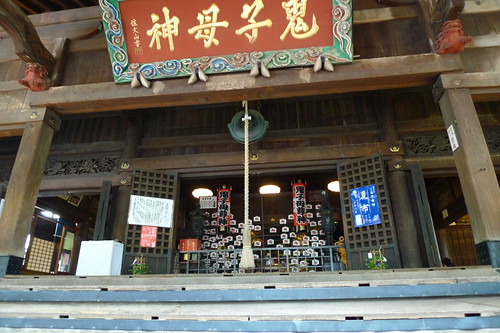
The Kishibojin is a goddess, also known as Hariti. This is an excerpt from its Wikipedia entry:
(I learn something new everyday.)
It was one-thirty in the afternoon, and there was a light drizzle. Visitors were pretty sparse.
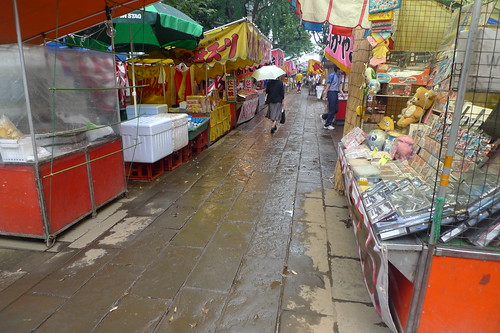
Yet the stalls I saw brought back fond memories of my New Year countdown trip in Kansai trip (check out my masterfully edited vacation videos here and here if you haven't already, parts of it were even on TV when I was invited for a chat at the NTV7 Breakfast Show back in February).
I then saw a little girl in a cute raincoat standing in front of the temple, smiling for her mother's camera.

There were a few hanging out in the temple.

A small group of people arrived later, most were mentally disabled. One was being pushed in a wheelchair. Their caretakers led them through the temple grounds.
I continued my way past the stalls.
Perhaps it was the rain. Or maybe it was the wrong time of the day.
But seeing so few people at the festival felt a little depressing.
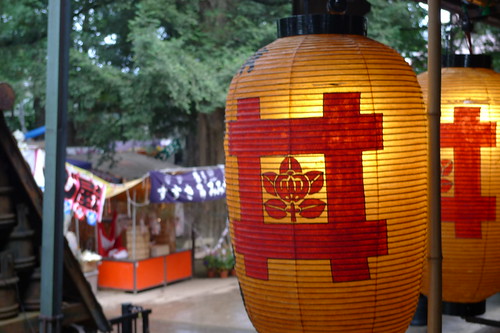
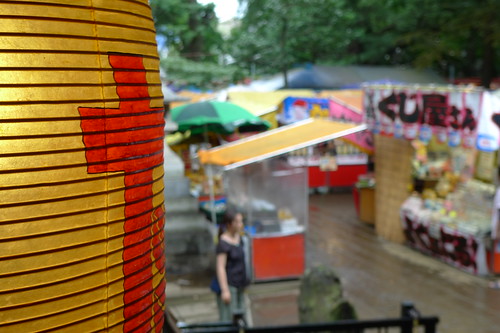

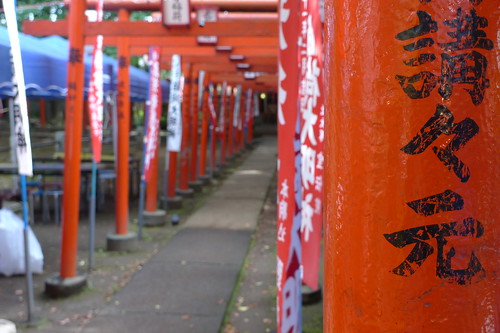
Nearly half a day later, it was already midnight. I returned from Shibuya and went to the 99 yen shop next to the Zoshigaya station. A couple of young women were there too. One wore a yukata.
They spoke to one another in soft tones. Occasionally they giggled among themselves.
I wondered whether they had just returned from the summer fair.

The Kishibojin is a goddess, also known as Hariti. This is an excerpt from its Wikipedia entry:
Hārītī (Sanskrit), also known as Kishimojin in Japanese:鬼子母神, is a Buddhist goddess for the protection of children, easy delivery, happy child rearing and parenting, harmony between husband and wife, love, and the well-being and safety of the family. Women without children also pray to Kishimojin to help them become pregnant.
Originally, Kishimojin/ Hariti was a cannibalistic demon. She had hundreds of children whom she loved and doted upon, but to feed them, she abducted and killed the children of others. The bereaved mothers of her victims pleaded to Śākyamuni Buddha to save them.
Śākyamuni stole Aiji, youngest of Kishimojin's sons, and hid him under his rice bowl. Kishimojin desperately searched for her missing son throughout the universe. Finally, she pleaded with Sakyamuni for help. The Buddha pointed out that she was suffering because she lost one of hundreds of children, and asked if she could imagine the suffering of parents whose only child had been devoured. She replied contritely that their suffering must be many times greater than hers, and vowed to protect all children.
Kishimojin became the goddess of easy birthing and the protection and parenting of children.
Some stories describe her as an aspect of Kannon. She is also sometimes identified with the Hindu goddess Kali.
(I learn something new everyday.)
It was one-thirty in the afternoon, and there was a light drizzle. Visitors were pretty sparse.

Yet the stalls I saw brought back fond memories of my New Year countdown trip in Kansai trip (check out my masterfully edited vacation videos here and here if you haven't already, parts of it were even on TV when I was invited for a chat at the NTV7 Breakfast Show back in February).
I then saw a little girl in a cute raincoat standing in front of the temple, smiling for her mother's camera.

There were a few hanging out in the temple.

A small group of people arrived later, most were mentally disabled. One was being pushed in a wheelchair. Their caretakers led them through the temple grounds.
I continued my way past the stalls.
Perhaps it was the rain. Or maybe it was the wrong time of the day.
But seeing so few people at the festival felt a little depressing.




Nearly half a day later, it was already midnight. I returned from Shibuya and went to the 99 yen shop next to the Zoshigaya station. A couple of young women were there too. One wore a yukata.
They spoke to one another in soft tones. Occasionally they giggled among themselves.
I wondered whether they had just returned from the summer fair.